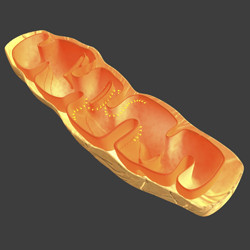Mitochondria and cancer
Mitochondria are specialised organelles found in eukaryotic cells with pleiotropic functions, including energy production, regulation of cell death and proliferation. They can divide by a process known as fission that involves various proteins, including the large GTPase dynamin-related protein 1 (Drp1). Mutations in these proteins may lead to various mitochondrial diseases and even cancer. Scientists on the EU-funded 'Exploring the role of mitochondrial dynamics in tumor regulation by Cop1' (COP1-DRP1) project investigated the involvement of the constitutive morphogenetic protein 1 (Cop1) in mitochondrial morphology and function. Previous work had shown that loss of Cop1 results in increased cell death, DNA damage, mitochondrial fragmentation and accumulation of Drp1. In the present study, researchers wished to connect the tumour suppressor function of Cop1 with its impact on mitochondria physiology. In this context, they generated cells lacking Cop1 and found an acquired proliferative capacity associated with an altered mitochondria morphology caused by Drp1. Additional experiments demonstrated that Drp1 is required for proliferation and cell cycle progression, suggesting its potential involvement in tumour formation. However, this effect was only evident in cells with concomitant deletion of p53, indicative of a faulty DNA damage surveillance pathway. In vivo, mice lacking Cop1 spontaneously develop T-cell lymphoma. However, the role of mitochondria and Drp1 involvement has not been clarified. Future work of the COP1-DRP1 project is directed towards elucidating the mechanisms by which Drp1 alters mitochondrial physiology and induces tumour formation. Overall, the outcome of the study will unveil novel players in cancer formation with potential therapeutic value.
Keywords
Mitochondria, cancer, Drp1, tumor regulation, Cop1

